Covid: 'I couldn't hold my baby without permission'
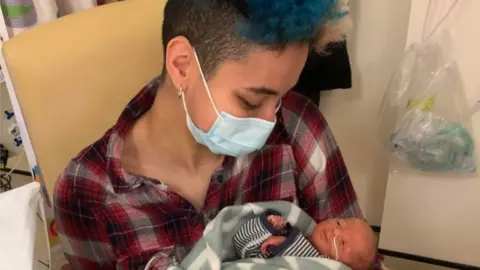 Letitia Cameron
Letitia CameronThousands of parents with babies in neonatal care during the pandemic were unable to smell, touch or kiss their little ones due to the levels of PPE they had to wear. BBC News meets some of them.
'I was on my own, without a baby to hold'
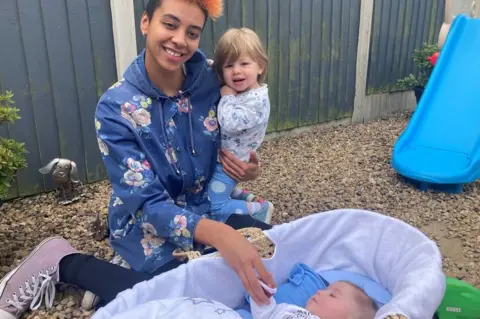
Letitia Cameron, from Derby, gave birth to her son Oakley-Noël via Caesarean section on 19 January.
"I was told he would need to be delivered early," she says.
"He held on until 33 weeks. There was a point where my blood pressure sky-rocketed and I felt physically weak."
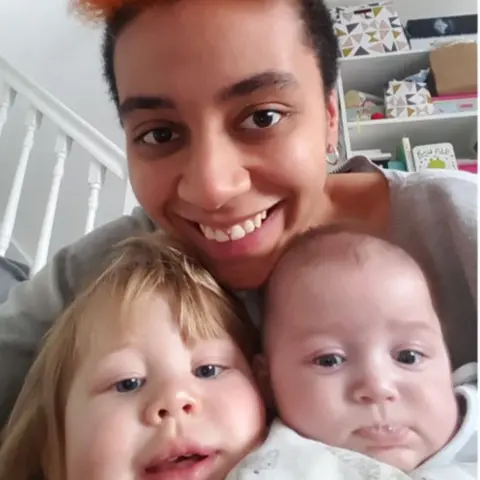 Letitia Cameron
Letitia CameronFor Letitia, a single mum with a 20-month-old girl, Orabelle-Grace, the isolation of lockdown had proved difficult even before her son's birth.
"I felt terrified I was going to collapse on my own with my daughter and she wouldn't be able to get help," she says.
Oakley-Noël was diagnosed with intrauterine growth restriction and Letitia was scheduled for a C-section at the Derby Royal Infirmary.
"I got shown him, very briefly," she recalls. "I didn't get to hold him.
"They had to whisk him straight off because he needed oxygen.
"I wasn't allowed to hold my son for four days because he was so poorly.
"I was sat on a ward on my own, without a baby to hold, when all the other mothers were around me, carrying their babies."
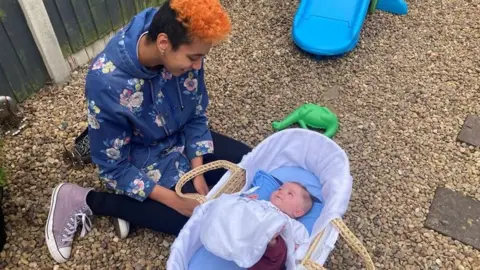
Even as Oakley-Noël began to stabilise, Letitia says she felt she could not have any meaningful physical contact with him due to the PPE she was wearing.
"The mask made it hard for him to identify me," she says.
"They were tough days."
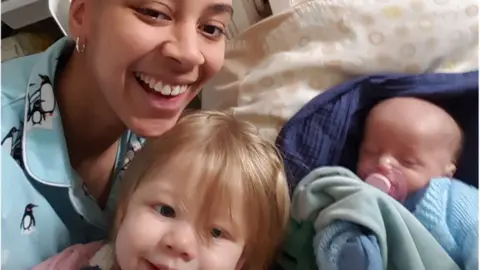 Letitia Cameron
Letitia CameronLetitia wishes the guidelines had been more flexible.
"There should have been chances to remove masks so you could physically touch your baby," she says.
"It felt as if there was a massive barrier between us. It affected the early bonding. I couldn't hold or snuggle him."
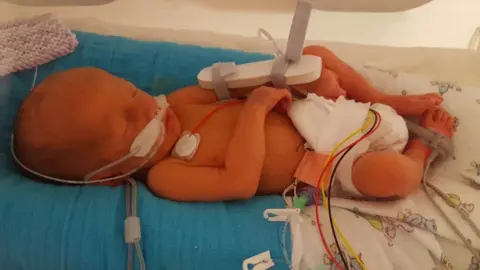 Letitia Cameron
Letitia CameronLetitia's friends and family were unable to visit the unit.
"It would have been so nice for my daughter to see her brother," she says.
"It wasn't the staff's fault - they saved my son's life."
Now Oakley-Noël is back at home, Letitia has finally had the joy of watching her family bond.
"We have had to find our own way of being," she says.
"He's very calm, very patient. He absolutely lights up when he sees his sister.
"At last I feel he knows who I am."

'He didn't know what a smile was'
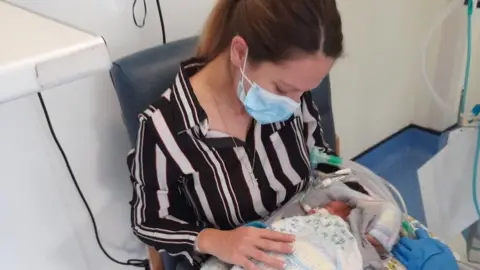 Charmaine Wrightson
Charmaine WrightsonCharmaine and Rickie Wrightson's son Oliver was born by Caesarean at 26 weeks in November, weighing just 850g (29oz).
Shortly afterwards, Oliver was taken to the neonatal intensive care unit at William Harvey Hospital, in Ashford, Kent - an hour away from where the couple live, in Margate.
He would not come home for five months.
During that time, his parents only saw him twice together and never without PPE.
"At first we couldn't even touch him," says Charmaine.
"He was still very vulnerable. Rickie and I weren't allowed in the unit together. When one went in, the other had to sit in the car outside."
As Oliver grew and his health stabilised, Rickie and Charmaine were able to cuddle him, change him and wash him - but only one parent at a time.
"It became tough for the one who was left sitting in the car," says Charmaine.
"In the end, we decided we would go separately. For half a year we didn't see each other."
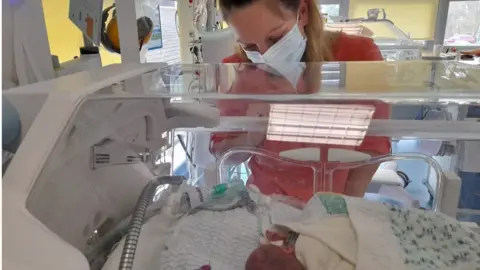 Charmaine Wrightson
Charmaine WrightsonCharmaine and Rickie began to worry about Oliver's development.
"It was horrible," says Charmaine.
"He was so tiny. His little head was right there on your chest but you couldn't see Oliver properly - all you could see was the mask.
"You would cradle him in your arms but you would always have this blue mask in your line of vision.
"I worried about him being in this world of masks. I was thinking, 'He's eight weeks now and he doesn't even know what a smile is'.
"There was definitely a point in his development where he should have been smiling.
"They always said Oliver was the baby who learned how to smile with his eyebrows.
"Even the nurses, these amazing women who were looking after our baby 24/7, we never really saw their faces."
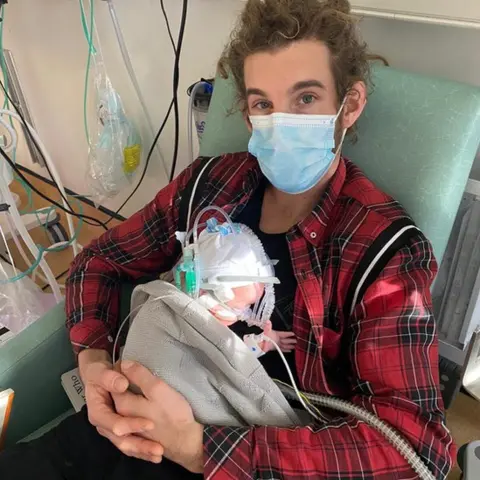 Charmaine Wrightson
Charmaine WrightsonShe understands the reasons behind the protection but questions whether some flexibility could have been allowed.
"For special days like Christmas and New Year, perhaps they could have let us both in so we could be with our baby," she says.
"At New Year, Rickie was with Oliver at midnight while I was sat in the van outside in the car park."
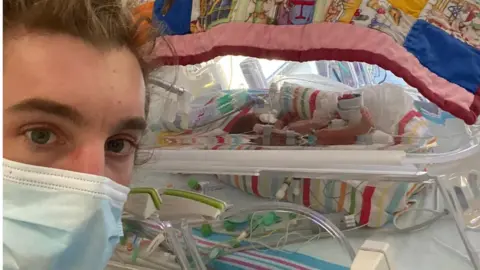 Charmaine Wrightson
Charmaine WrightsonEven when Oliver was taken to another hospital for surgery to close a hole in his heart, his parents were not allowed to be there together.
"I wasn't even allowed to travel in the ambulance with Oliver," says Charmaine.
"I had to sign the consent form alone. Rickie said, 'Why didn't you just ring me?'
"I didn't even know why - I think it's because I could barely take in myself what was going on."
Following his treatment Oliver was finally allowed to come home, although he remains on oxygen.
"I had got to know Oliver in a different way from Rickie and we both had to adjust," says Charmaine.
"For things like the first bath, the first time we got to hold him, we weren't able to experience those things together."
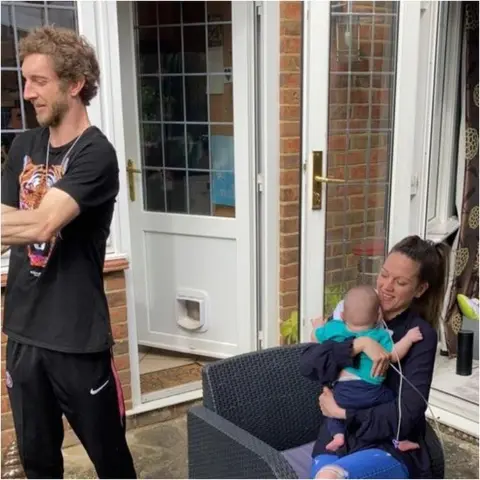 Charmaine Wrightson
Charmaine WrightsonDespite what the family has endured, Charmaine remains positive.
"Oliver knows who we are," she says.
"If we both sit looking at him, he's looking back and forth at us.
"And now we have got him home, he never stops smiling."

'I couldn't hold my son without permission'
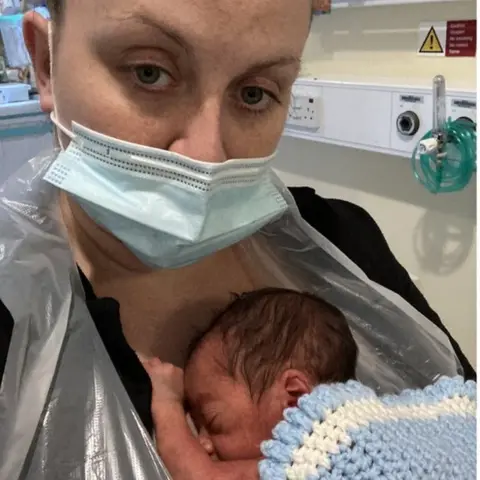 Danielle Chirara
Danielle ChiraraDanielle and Takudzwa Chirara, from Wolverhampton, had their third child Orion in September when Danielle was 31 weeks pregnant.
"I went into hospital with pre-eclampsia," she says.
"Once I had seen Orion, they took him away to neonatal."
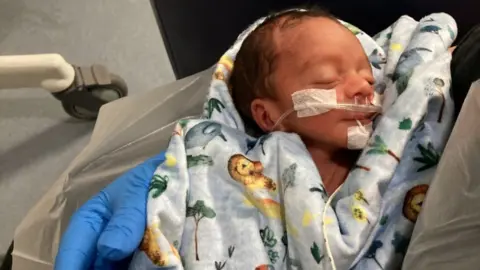 Danielle Chirara
Danielle ChiraraDanielle was able to hold Orion the following day - but only wearing full PPE.
"I had to put on a mask, wash my hands and put gloves and an apron on," she says.
"I felt like I had to ask for permission to hold my baby.
"I thought, 'It's my baby. Why do I need to do all this?'"
Two days after his birth, Orion was moved from New Cross Hospital, in Wolverhampton, where Danielle was being treated, to Walsall Manor.
"They said New Cross was a specialist hospital and my baby didn't need that kind of care but I was still at New Cross and couldn't leave," she says.
After five days, Danielle was discharged and she was able to visit Orion but she and Takudzwa found the rules at Walsall Manor were stricter.
"I couldn't hold Orion without permission," she says.
"I couldn't change his nappy without wearing gloves and a mask. I couldn't hold his hand without gloves. That was obviously really difficult.
"When you have a plastic apron on, you are worried you will suffocate your baby.
"I wanted to breastfeed but my milk dried up. I couldn't feel him or smell him."
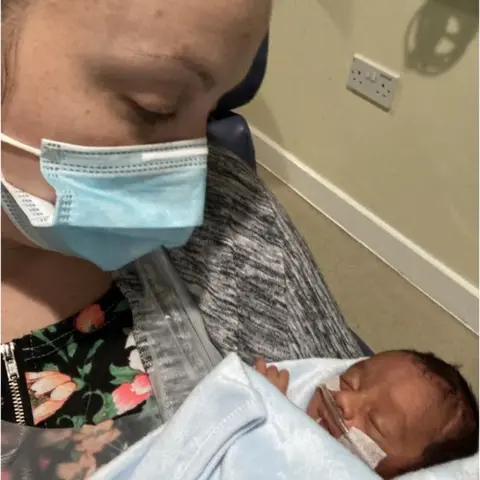 Danielle Chirara
Danielle ChiraraTo make things even more difficult Danielle and Takudzwa could only visit one at a time.
"My husband couldn't stay with me," she says.
"It was lonely, especially when we were there all day.
"There were times I would just sit there and not hold Orion because I was scared I would be told off.
"Eventually I pleaded with them to bring him back to New Cross."
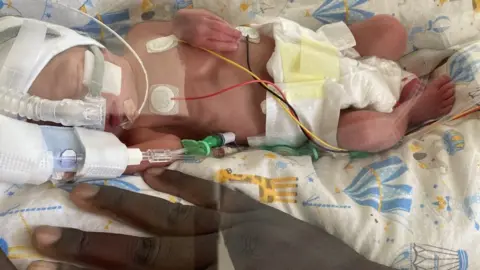 Danielle Chirara
Danielle ChiraraAt New Cross, the couple were allowed to be with Orion together.
"They were more lenient about gloves and aprons," says Danielle.
"Just having those few restrictions lifted helped.
"To have a baby taken away to intensive care and then not to be able to touch him makes it so much more difficult.
"It's not just hard on the parents - I have two older children at home. They weren't able to be there and didn't understand what had happened.
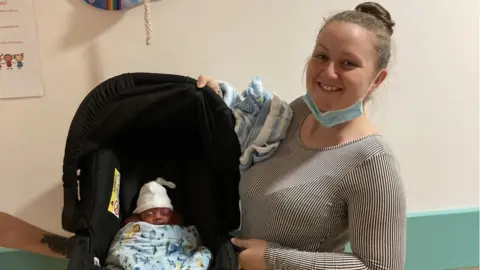 Danielle Chirara
Danielle ChiraraAfter four weeks, Orion was able to come home. It was only then, Danielle says, that she really felt like she became his mother.
"Things are good," she says.
"At the time, I felt as if I hadn't had a baby at all. It didn't feel real until I got him home."

The hospitals involved in each family's case said they had referred to national guidelines around neonatal care.
Caroline Lee Davey, from Bliss, a charity that supports premature and sick babies, believes as many as 125,000 parents whose children require neonatal care have been affected by "distressing" Covid restrictions.
"Sometimes babies are in neonatal care for months and we have heard of parents being given really difficult information about their children's life chances alone and having to relay that to the other parent," she says.
"One of the most important things for premature and sick babies is having skin-to-skin contact - but lots of parents haven't been able to do that, due to wearing masks, aprons and gloves."
Bliss called on the government to develop a roadmap for families experiencing neonatal care.
"At the start of the pandemic, when so much was unknown, these kind of restrictions made sense but we have learned an awful lot about infection control in that time," she says.
"In that context, we find it distressing that restrictions remain in place."
A Department of Health and Social Care spokesperson said: "Our hearts go out to any parent with a child in neonatal intensive care and we recognise how important it is for both parents to have contact with their baby.
"The NHS continues to work hard to ensure this is possible, while maintaining high levels of safety standards for all patients, staff and visitors.
"Guidance is clear that parents of babies in neonatal critical care need to be involved in their baby's care as much as possible, and should not be considered visitors."

Follow BBC East Midlands on Facebook, Twitter, or Instagram. Send your story ideas to [email protected].
